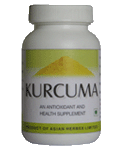| KURCUMA® (Capsules) |
| |
Lifestyle diseases like Ischemic heart disease (IHD), Diabetes mellitus (DM), Hypertension (HTN), Cancers are on the rise across the globe, over infectious diseases. Various causative pathways leading to these diseases are being explored. One among them is free radical mechanism. Increased free radicals in biological systems are implicated in various pathological conditions like cancer, autoimmune disorders, diabetes, Alzheimer’s and premature aging.
Our product KURCUMA® can protect from oxidative damage caused by various pathological conditions. KURCUMA® can decelerate pathogenesis of the above said diseases and may reduce the intensity of the diseases. In healthy individuals, they prevent occurrence of the above by virtue of its antioxidant & bioprotective mechanism.
Curcumin, a natural phenolic compound found in turmeric (Curcuma longa), is a powerful antioxidant and acts as a free radical scavenger. Curcumin‘s antioxidant activity has been confirmed both in in-vitro and in-vivo studies. In a study, Curcumin has showed better antioxidant activity than vitamin E, Eugenol and Capsaicin in comparison .In another study, Curcumin lowered the production of ROS (Reactive Oxygen Species) that have been implicated in the development of various diseases. By virtue of its potent antioxidant activity, Curcumin can control the progression of these diseases.
In the formulation KURCUMA®, Green tea and Grape seed are known for their potent antioxidant activity. Various polyphenols in grape and green tea are tested and proven for antioxidant activity in many studies. They, flush out the free radicals produced in the body, and thus protect the biological systems. Ginger, the other ingredient has bioenhancing capability. Thus Ginger makes all other ingredients in the formula, more available to the body. Apart from bioenhancing property, Ginger has antioxidant activity.
|


|
| |
| Ingredients |
Each Capsule Contains:
Extract of Green tea 150 mg
(Camellia sinensis)
Extract of Grape seed 150 mg
(Vitis venefera)
Curcumin 100 mg
(from Curcuma longa)
Extract of Ginger 65 mg
(Zingiber officinale) |
| Application |
Antioxidant Supplement to Support* Healthy Organs and Tissues as
Antioxidantsmaintain Cell integrity |
| Serving size |
One Capsule |
| Caution |
Keep out of reach of children, do not use if pregnant |
| Safety |
This health supplement is considered safe when used in accordance with proper dosing guidelines as recommended |
| Packing |
60 capsules in a HDPE Container |
| *Disclaimer |
These statements have been not evaluated by the US Food and Drug Administration. This product is not intended to diagnose, treat, cure or prevent any disease |
References :
-
Total phenolics and antioxidant activities of fenugreek, green tea, black tea, grape seed, ginger, rosemary, gotu kola, and ginkgo extracts, vitamin E, and tert - butylhydroquinone; Rababah TM, Hettiarachchy NS, Horax R. J Agric Food Chem. 2004 Aug 11; 52(16):5183-6.
-
Antioxidant activity of plant extracts on the inhibition of citral off-odor formation.Liang CP, Wang M, Simon JE, Ho CT. Mol Nutr Food Res. 2004 Sep; 48(4):308-17.
-
Functional properties of spice extracts Obtained via supercritical fluid extraction; Leal PF, Braga ME, Sato DN, Carvalho JE, Marques MO, Meireles MA. J Agric Food Chem. 2003 Apr 23; 51(9):2520-5.
-
A Systematic Screening of Total Antioxidants in Dietary Plants1, Bente L. Halvorsen et al, J. Nutr. 132: 461–471, 2002.
-
Phenolic antioxidants from herbs and spices; Nakatani N, Biofactors.2000;13 (1- 4):141-6.
-
Review on some plants of Indian traditional medicine with antioxidant activity. Scartezzini P, Speroni E., J Ethnopharmacol. 2000 Jul; 71(1-2):23 – 43
-
Antioxidant Capacity of Tea and Common Vegetables; Guohua Cao, Emin Sofic, and Ronald L. Prior J. Agric. Food Chem., 44 (11), 3426 - 3431, 1996. Jf9602535 S0021-8561 (96) 00253-1.
-
Antioxidative activity of the tetrahydrocurcuminoids. Osawa, T et al (1995) Biosci. Biotechnol. Biochem. 59(9): 1609-12.
-
Antioxidant activity of curcumin and related compounds. Lipid peroxide formation in experimental inflammation. Rao, C.V. et al. (1993) Cancer Res. 55:259.
-
[Antioxidative effect of Chinese drugs], Zhou Y, Xu R.; Zhongguo Zhong Yao Za Zhi. 1992 Jun; 17(6):368-9, 373.
- Antioxidant activity of curcumin and related compounds Sharma, O.P. (1976). Biochem. Pharmacol. 25:1811-1812.
top back to formulations |
|
|

